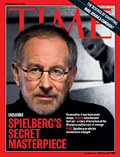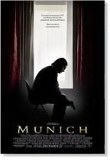|
 Time Article: Spielberg Takes on Terror Time Article: Spielberg Takes on TerrorMunich adroitly blends high-pressure action and humanity in a historical story that's all about our times.
The first and most important thing to say about Munich, Steven Spielberg's new film, is that it is a very good movie-good in a particularly Spielbergian way. By which one means that it has all the virtues we've come to expect when he is working at his highest levels. It's narratively clean, clear and perfectly punctuated by suspenseful and expertly staged action sequences. It's full of sympathetic (and in this case, anguished) characters, and it is, morally speaking, infinitely more complex than the action films it superficially resembles-pictures that simply pit terrorists against counterterrorists without an attempt to explore anyone's motives and their tragic implications.
Munich begins and ends with, and frequently reverts to, an account of an especially heinous historical act: the capture and eventual murder of 11 Israeli athletes at the 1972 Olympic Games by a Palestinian terrorist group calling itself Black September. Because television was omnipresent at the Games, the entire world was witness to that awful event. Indeed, it's not too much to say that most of us for the first time perceived the face of modern terrorism in the images that abc and the other networks broadcast of those frightful 24 hours. Or, in fact, did not fully perceive it, since the iconic image of the attack was of a ski-masked terrorist standing on the balcony of the Israelis' Olympic Village quarters peering back at the cameras that were peering at him.
But-and this is why munich works so well-the movie is not primarily about that Munich. It is about the aftermath, in which the Israeli government, with Prime Minister Golda Meir's full endorsement, mounted a secret war of revenge against the murderers. In one of the movie's most crucial lines, she says, "Every civilization finds it necessary to negotiate compromises with its own values." That negotiation-also carried out in the increasingly troubled mind of Avner Kauffman, leader of the Israeli hit squad on which the movie concentrates (there were several)-raises Spielberg's film above the thriller level, granting it real, often poignant, distinction.
"You are assigned a mission, and you do it because you believe in the mission, but there is something about killing people at close range that is excruciating," says Spielberg. "Perhaps [your victims] are leading double lives. But they are, many of them, reasonable and civilized too." Killing them, he says, has unintended consequences. "It's bound to try a man's soul, so it was very important to me to show Avner struggling to keep his soul intact." (The moviemakers would not reveal the identity of the real Avner, whom they talked to at length during their research. In Spielberg's opinion, though, his soul was tried too much. "I don't think he will ever find peace.") More significantly, Spielberg wonders if the Israelis and the Palestinians will ever find peace. "I'm always in favor of Israel responding strongly when it's threatened. At the same time, a response to a response doesn't really solve anything. It just creates a perpetual-motion machine," he says. "There's been a quagmire of blood for blood for many decades in that region. Where does it end? How can it end?"
A big, expensive movie-reported to have cost around $70 million-that dives headfirst into Middle East conflicts: Does that give, say, a studio head pause? "Yes, to be honest," says Universal chairman Stacey Snider without hesitation. "At the time when we started it, [the story] felt more quaint. But as we went through the development process, the good and bad news was that it became more relevant."
Indeed, since June, when filming began, the movie has been surrounded by rumors, criticism and suggestions that Spiel- berg was too pro-Israel to make a fair movie on the subject. The filmmakers responded by keeping the details of the movie very quiet. Reporters were not allowed to visit the sets in Malta, Budapest, New York and Paris, and only a few actors got the complete script-many didn't even know what the whole movie was about. The shoot took three months, a quick turnaround for a movie to be released Dec. 23. That lessened the chance of leaks, as did the fact that most of the crew members were loyal, tight-lipped veterans of past Spielberg movies. When Time saw the movie, it had just been finished. There had been none of the usual test, press or studio-executive screenings; the movie's star, Eric Bana, had not even seen it. And there has been little advance publicity; Spielberg has done no interviews about the movie with anyone but TIME.
"I never like to draw lessons for people," says screenwriter Tony Kushner of how his script deals with the Middle East question. "It's not an essay; it's art. But I think I can safely say the conflict between national security and ethics raised deep questions in terms of working on the film. I was surprised to discover how much the story had to do with nationality vs. family, and questions about home and being in conflict with somebody else over a territory that seems home to both people."
There is an entirely fictional scene in the movie in which Avner and his Palestinian opposite number meet and talk calmly, with the latter getting a chance to make his case for the creation of a homeland for his people. That scene means everything to Kushner and Spielberg. "The only thing that's going to solve this is rational minds, a lot of sitting down and talking until you're blue in the gills," says Spielberg. Without that exchange, "I would have been making a Charles Bronson movie-good guys vs. bad guys and Jews killing Arabs without any context. And I was never going to make that picture."
He almost did not make this picture, which he thrice denied. It was Kathleen Kennedy, his longtime friend and frequent producing partner, who acquired the book on which Munich is based, George Jonas' Vengeance, in 1998. But Spielberg shied away from it, in part, he says, because he had learned at his parents' knees that Middle East politics is such a difficult, passionately argued and unresolvable topic. "I'll leave it to somebody else," he recalls saying, "somebody braver than me." Then, in 1999, the persistent Kennedy prevailed on him to at least reconsider the matter. But two years later, 9/11 happened, and Spielberg felt the story would be perceived as exploitative. The fact that Spielberg could not get a script that in any way satisfied him-three were written-stalled him further.
"We all talk in genres," Kennedy says, "and this is clearly a thriller from a movie-making standpoint." On the other hand, it had to be a character-driven and intellectually acute thriller to satisfy her and Spielberg's ambitions for it. So "we knew and took the approach early on that we are not making a documentary." At some point the phrase "historical fiction" entered their conversations. They understood that they would have to compress and conflate some of their material. And, yes, do some inventing as well. "The fiction," says Spielberg, "comes in the interpersonal relationships of the five members of the ex-Mossad team" on which the film focuses. "I was very careful," he says, "to start the movie by saying 'Inspired by real events,' because until the secret files are opened up nobody will really know actually who did what."
But Kushner could make a good, entertaining guess. Spielberg had long wanted to work with the Pulitzer prizewinning author of Angels in America, and once he had solved Kushner's concerns about formatting a screenplay ("I said, 'Well, there's a program called Scriptor-put it on your laptop and you don't have to worry about that again'"), Kushner said he would try a few scenes. They became a 300-page first draft, written largely on spec, after which he and Spielberg happily collaborated for a little more than a year to complete the script. "You speak the words, and I'll provide the pictures," Spielberg remembers saying. "It was a lot of e-mails and arguments on the phone," Kushner says, "and an exciting amount of give and take. I think we really affected one another politically and emotionally." Another challenge was to create a sense of identification with Avner and his team. Avner, in particular, is a man not very in touch with his inner life. "I always felt like the character was trying to convince himself of an ideal without necessarily coming to terms with what the ideal was," says Bana. The whole team, says Kennedy, is five men on a mission who don't want to think of themselves as anything like the men they are pursuing.
Kushner located a dry, allusive, sometimes bleakly comic language for them, and Spielberg often found himself just listening to Kushner's words, momentarily forgetting his picture-making part of their deal. In a situation rare in modern filmmaking, the screenwriter was on the set 90% of the time. "When something was more action driven, Steven would take the lead," says Kennedy, "and when something was more dialogue driven, Tony would take the lead." Says Spielberg: "It was as close as I've ever come to directing a play." That does not mean the picture is sedentary. It ranges the world from Paris to Brooklyn, with stopovers in London, Beirut, Israel, Spain (or their geographical stand-ins), and it is full of derring-do and suspense. (Best such sequence: a child innocently answers a call on an explosive-laden phone meant to blow her father to kingdom come.) At more than 21/2 hours, Munich allows itself time to efficiently develop character, particularly among Avner's team, which is run-mostly from afar-by Geoffrey Rush's hard-assed executive spook.
The assassins include a hot-blooded South African hit man played by Daniel Craig, who is the next James Bond; Ciaran Hinds as his opposite, a meticulous cleanup artist; Mathieu Kassovitz as a toymaker who dabbles in bombmaking; and Hanns Zischler as an expert document forger. None of them have particularly accommodating natures, but the stress of living under constant danger becomes their bonding agent. The cast too came from all over the globe, including Israel and other parts of the Middle East. "It was like going to the U.N. every day," says Bana, an Australian. "There was always plenty of rich social and political discussion, no doubt about it."
Spielberg is at his best in visualizing a world he believes to be more menacing than it has ever been. That is more than a matter of noirish shadows. It is the hint of suspicious movement in the back of the frame, a pan that goes on a few frames longer than necessary, suggesting the possibility of a menace that may be present. Near the movie's end, a casual pan along the Manhattan skyline reveals the World Trade Center buildings. Had to show them, the director says. They existed at a historical moment in the mid-'70s. But there is more than historical veracity at work in that shot. The Twin Towers are the symbols of our new age of high (and endless) anxiety. Maybe there is, as Spielberg insists, no resonance between the fate of the Towers' victims and the fate of a few athletes in long-ago, faraway Munich. But inevitably the destiny of those Towers tinctures our thoughts, however much we wish to deny them. Dutiful men like Avner Kauffman will be sent forth to improvise a response to terrorism, whatever its source. And to live with the unintended consequences of their actions. Any movie that subtly, yet insistently reminds us of this blunt truth about the world we have inherited is worth seeing. And pondering.
By Richard Schickel, Time Magazine
|
 |